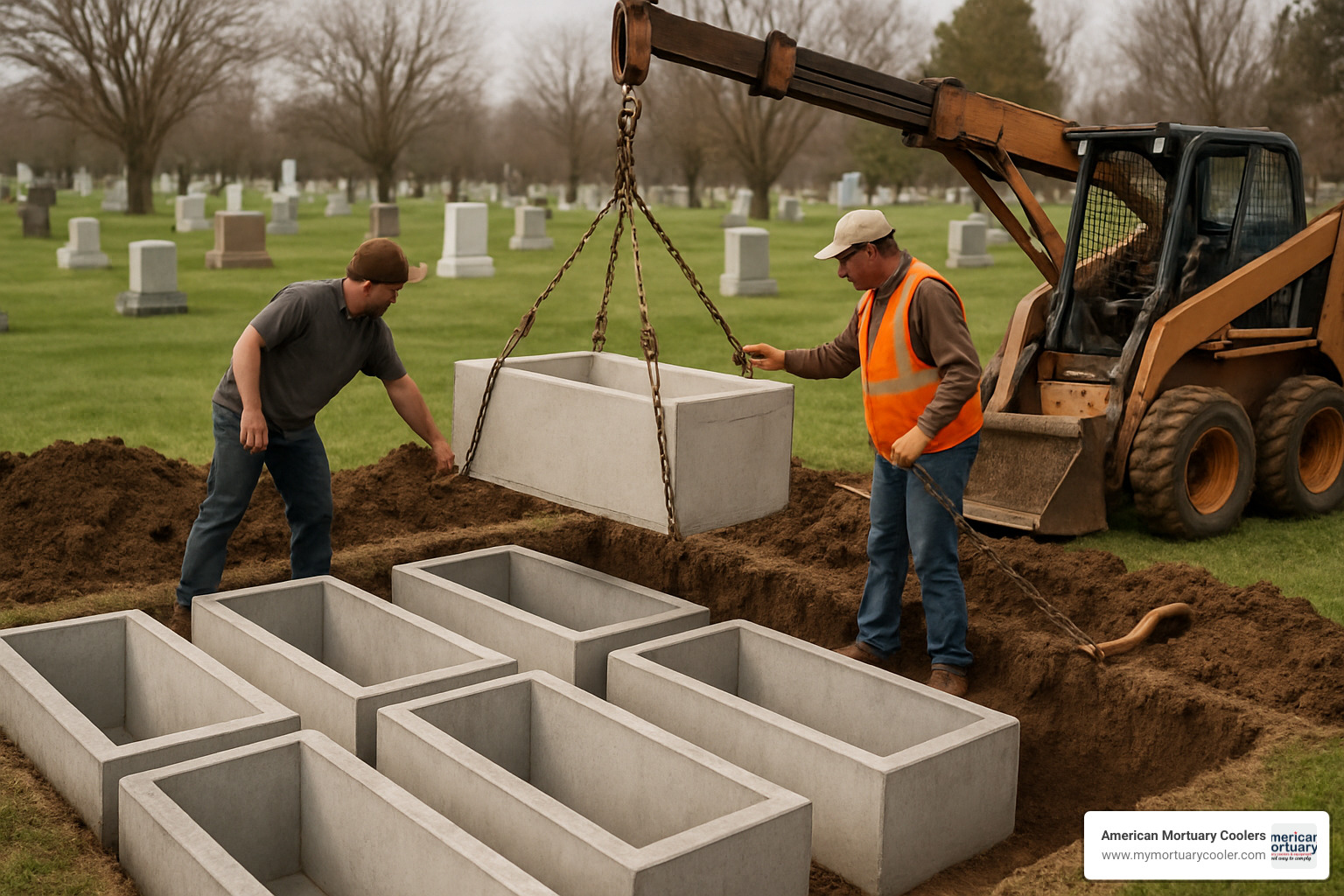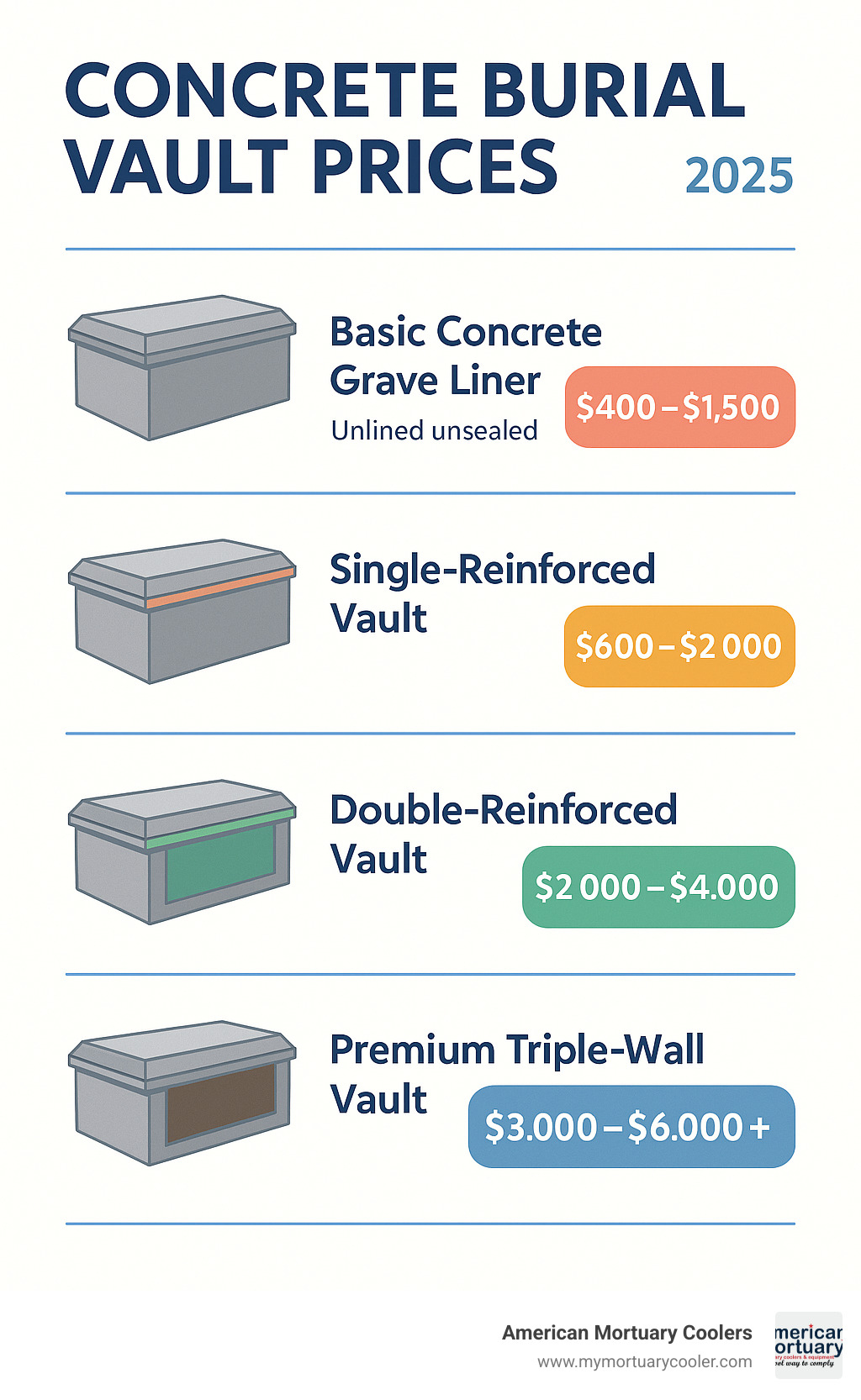
The Definitive Guide to Comparing Concrete Burial Vault Prices
Understanding Concrete Burial Vault Pricing: What Every Funeral Director Needs to Know
Concrete burial vault prices range widely based on construction, materials, and features. Here's what you need to know:
Basic Price Ranges:
- Unlined concrete grave liner: $400-$1,500
- Single-reinforced concrete vault: $600-$2,000
- Double-reinforced concrete vault: $2,000-$4,000
- Premium lined concrete vault: $3,000-$6,000+
- Installation fees: $100-$400 additional
Key Price Factors:
- Interior lining materials (bronze, copper, stainless steel)
- Number of reinforcement walls (single, double, triple, quad)
- Sealing vs. non-sealing construction
- Brand reputation and certification
- Regional delivery costs
When families face burial planning, understanding vault costs helps you guide them confidently. Most cemeteries require at least a basic concrete grave liner to prevent ground settling.
The price difference between a basic $885 concrete liner and a premium $5,825 bronze-lined vault reflects real differences in materials, construction, and long-term protection. Installation fees typically add another $100-$400.

Burial Vaults 101: Concrete vs. Grave Liners
Understanding the difference between burial vaults and grave liners can save both confusion and money. These aren't just fancy names - they're completely different products with very different concrete burial vault prices.
Think of it this way: a grave liner is like a basic cardboard box, while a burial vault is like a sealed storage container.
A concrete burial vault serves as a protective outer container that completely surrounds the casket underground. These vaults use reinforced concrete construction and feature sealed designs with specialized interior linings. The key word is sealed - these vaults create a barrier against water, soil pressure, and environmental factors.
A grave liner is an unsealed concrete shell with drainage holes. Its main job is structural support to prevent ground settling. Water flows freely in and out through drainage holes.
This fundamental difference explains why grave liners cost $400-$1,500 while sealed burial vaults range from $1,695 to over $5,000.
Construction differences are significant. Companies like Doric create burial vaults with multiple reinforcement layers - single, double, triple, and quad-wall construction. Each layer increases protection and cost. A basic Doric concrete liner starts at $885, while their premium triple-wall stainless steel-lined vault reaches $3,380.
Most cemeteries require at least a basic grave liner for ground integrity. The Federal Funeral Rule requires funeral homes to tell you that sealed vaults aren't legally required in most areas.
More info about casket platforms
What Is a Concrete Burial Vault?
A concrete burial vault is a reinforced concrete fortress designed to protect a casket after burial. Unlike grave liners, these vaults feature sealed construction with specialized interior linings that create genuine protective barriers.
Construction uses high-strength concrete with compression ratings of 2,950 PSI or higher - strong enough to handle soil pressure and heavy cemetery equipment.
Premium models include reinforcement materials like ABS Trilon plastic, Strentex linings, or metal components. Sealing uses tongue-and-groove design between base and lid, often with gaskets or sealants.
Interior linings drive price variations. Basic models use simple plastic liners, while premium versions feature bronze, copper, or stainless steel. A Bronze Triune vault with 32-ounce solid bronze lining costs $4,795, compared to $1,395 for an unlined concrete vault.
How Does It Differ From a Grave Liner?
The biggest difference is sealing. Grave liners are intentionally unsealed with drainage holes allowing water flow. This prevents floating during floods but offers zero protection against moisture or soil intrusion.
Sealed burial vaults eliminate drainage holes and use gasket systems for protective barriers.
Construction quality varies dramatically. Basic grave liners use minimal concrete with no interior lining, while burial vaults feature reinforced concrete with protective coatings. A concrete maintenance shell costs $1,495-$2,386, while comparable sealed vaults range $2,125-$3,550.
Grave liners prevent ground settling - period. Burial vaults provide comprehensive protection against soil pressure, moisture, and chemical exposure.
Why Do Cemeteries Require Them?
Most cemeteries require burial vaults or grave liners for practical reasons that have nothing to do with protecting your loved one. Understanding these requirements helps explain why concrete burial vault prices vary dramatically.
The biggest concern is ground settling. When caskets deteriorate over decades, soil above can collapse into dangerous depressions. This creates safety hazards for maintenance equipment and requires constant soil replacement.
Heavy equipment safety drives many policies. Modern cemetery maintenance relies on riding mowers and utility vehicles. Without proper ground support, equipment can break through settled areas.
Lawn aesthetics matter significantly. Constantly settled graves create an unkempt appearance affecting the entire property's value.
Important: the Federal Funeral Rule prohibits funeral homes from claiming burial vaults are legally required when they're not. Most areas don't mandate vaults by law - these are cemetery policies.
Veterans' benefits provide exceptions. VA cemeteries supply basic concrete grave liners at no cost, potentially saving families $1,000-$1,500.

Cemetery & Legal Requirements You Must Check
Before purchasing any vault, research requirements thoroughly. Cemetery requirements aren't standardized, and what's acceptable at one location might be prohibited at another.
Cemetery documentation spells out minimum vault requirements, approved manufacturers, and installation procedures. Some maintain strict approved vendor lists, while others welcome any licensed provider.
Installation permits add cost and complexity. Depending on location, permits might cost $100-$250. Some cemeteries handle paperwork internally, others require families to manage permits.
NCBVA standards provide quality assurance. The National Concrete Burial Vault Association certifies manufacturers through independent inspections. Companies like Doric require audits of each licensee plant.
Veterans' benefits can dramatically change costs. VA cemeteries provide basic liners at no charge, but families wanting upgrades pay the difference between basic costs and premium prices.
Documents needed include proof of purchase, installation permits, and compliance certificates. Some cemeteries require advance approval, making last-minute changes difficult.
Concrete Burial Vault Prices: Current Ranges & What Drives Them
Understanding concrete burial vault prices helps steer options during difficult times.
Basic concrete grave liners start around $400-$1,500. These unlined, unsealed containers prevent ground settling but don't offer protection against moisture. The Casket Store offers a concrete liner for $885, while funeral homes charge $1,395-$1,675 for similar products.
Single-reinforced concrete vaults run $600-$2,000. These incorporate plastic or steel reinforcement adding structural value. Sims Funeral Services prices their Monarch vault at $1,570, while Conner Family offers a Monticello vault for $1,695.
Double-reinforced vaults in the $2,000-$4,000 range provide improved protection. The Casket Store's Titan Silver double-wall vault costs $1,175, though premium models reach $2,695.
Triple-wall vaults with metal linings command $3,000-$6,000+. Bronze-lined vaults cost $4,525-$5,995, copper alternatives $4,395-$5,450, and stainless steel options $3,380-$3,995.
Installation and delivery fees add $100-$400. Georgia Funeral Care separates their $1,395 vault price from a $595 service charge.

Cost Factors in Detail
Material composition drives the biggest price differences. High-strength concrete with 2,950 PSI compression costs more but provides superior durability.
Interior lining materials create dramatic price jumps. Basic ABS plastic adds minimal cost, while premium metal linings change numbers quickly: 16-ounce copper costs $4,395, 32-ounce bronze reaches $4,795, and stainless steel alternatives offer similar protection at $3,995.
Reinforcement layers multiply protection and cost predictably. Single-wall handles basic needs, double-wall adds strength, triple-wall incorporates multiple materials, and quad-wall represents ultimate protection.
Geographic factors influence material costs, labor expenses, and transportation. Freight costs can add $200-$500, particularly for remote locations.
Extra Fees to Watch For
Delivery charges vary by distance and timing. Standard delivery within 50 miles costs $100-$200, while remote locations add $300-$500.
Installation fees cover placement, lowering, and sealing. Basic weekday setup runs $400-$595, with weekend premiums adding $100-$200.
Rush order fees add 25-50% to base prices when families need immediate delivery.
Concrete Burial Vault Prices vs. Other Materials
Understanding how concrete burial vault prices compare to other materials helps make the best choice for budget and protection needs. Concrete typically offers solid value without breaking the bank.
Steel vaults present interesting alternatives. Basic 12-gauge steel vaults run $1,295-$1,395, matching mid-range concrete options. Premium steel with galvanized or stainless construction can exceed $5,000, matching high-end concrete with bronze linings.
Steel's advantage is weight - much lighter than concrete, making installation easier and potentially reducing setup costs. The downside? Corrosion resistance varies dramatically depending on steel grade and coating.
Polymer vaults represent newer technology. Polypropylene construction delivers 2,950 PSI strength while weighing significantly less. The Triple H Standard Vault costs $377.37 for three units - roughly $125 per vault, substantially lower than comparable concrete options.
However, polymer vaults lack decades of real-world underground performance data that concrete provides.
Aluminum vaults using 1/8-inch series 5052 metal offer excellent corrosion resistance, especially in coastal areas. Initial investment often exceeds concrete alternatives, but durability can justify premium pricing in challenging environments.
Scientific research on corrosion rates
Pros & Cons Comparison
Durability stands as concrete's biggest strength. Properly constructed concrete vaults outlast generations under normal conditions. Impressive compression strength handles soil loads and heavy equipment without problems.
Cost predictability makes concrete attractive for budget management. Unlike metal alternatives fluctuating with commodity prices, concrete pricing remains relatively stable.
Availability gives concrete huge advantages. Local manufacturers typically stock common sizes, meaning shorter delivery times and lower freight costs.
Challenges include weight - typical vaults weigh 2,000-3,000 pounds, requiring heavy installation equipment and potentially increasing setup costs.
Environmental impact concerns include concrete production's carbon footprint, though concrete's indefinite lifespan provides offsetting benefits.
Steel offers lighter weight and easier customization but faces corrosion challenges. Polymer provides weight advantages and potentially lower environmental impact but lacks long-term performance data.
Smart Ways to Save on Concrete Burial Vault Prices
Smart planning and shopping can save families hundreds or thousands on concrete burial vault prices.
Pre-planning stands out as the most effective cost control method. Without immediate pressure, you can research thoroughly and compare prices across providers. Many funeral homes offer pre-need pricing with payment plans saving 10-20% compared to at-need purchases.
Multiple quotes should be standard practice. Research shows the same Monticello vault costs $1,695 at one funeral home but $2,125 at another - a $430 difference for identical products. The Federal Funeral Rule requires written price lists.
Timing makes real differences. Off-peak periods offer better pricing, while rush orders carry premium charges. Weekday burials might save $100-$200 in installation fees versus weekends.
Veteran benefits eliminate vault costs at VA cemeteries, while private cemeteries often offer veteran discounts. These savings can exceed $1,000.
Affordable Pine Box Caskets for Every Budget
Can Families Buy Direct?
Direct vault purchasing sounds appealing given funeral home markups of 50-100%, but reality is complicated.
Most manufacturers don't sell directly to consumers, working through licensed providers instead.
Online retailers like The Casket Store offer direct sales with competitive pricing. Their $885 concrete liner compares well to funeral home prices of $1,395-$1,675. However, shipping costs for heavy concrete vaults can eliminate much savings.
Storage becomes problematic with direct purchases. Vaults need secure, weather-protected storage until burial, which most families lack.
Installation coordination gets tricky. You'll manage cemetery requirements, timing, and equipment needs yourself during stressful times.
Negotiation & Discount Checklist
The Federal Funeral Rule gives real negotiating power when used effectively.
Request written price lists from multiple funeral homes. They're required to provide these, including vault options and installation fees.
Evaluate bundle deals carefully. Some offer genuine savings, others just shift expenses around.
Consider downgrading to basic liners if cemetery allows. The difference between sealed vaults and basic liners can exceed $1,000.
Question unnecessary upgrades directly. Decorative elements and premium linings add significant costs without functional benefits.
Use competitive quotes as leverage. Funeral homes in competitive markets often match or beat competitor pricing.

Frequently Asked Questions about Concrete Burial Vault Prices
Are vault installation fees negotiable?
Yes, vault installation fees often have wiggle room, especially with flexible timing or bundled services. Most funeral homes charge $400-$595 for standard weekday installation, but many reduce or waive fees with complete service packages.
Weekday services offer more negotiation flexibility than weekend burials. Weekend and holiday installations carry firm premium charges of $100-$200 that aren't negotiable.
Competitive urban markets provide more flexibility than rural areas with limited options. Getting documented quotes from several providers gives real negotiation leverage.
Pre-planning provides the strongest negotiating position without time pressure.
Do I really need a sealed vault?
Probably not legally, but maybe practically. The Federal Funeral Rule prohibits funeral homes from claiming sealed vaults are legally required when they're not. Most states don't mandate sealed vaults.
However, cemeteries might have different rules. Many require basic grave liners for ground settling prevention but don't necessarily require premium sealed versions.
The protection difference is substantial. Basic grave liners at $400-$1,500 provide structural support. Sealed vaults at $2,000-$4,000 create protective barriers against water, soil, and environmental factors.
Local conditions matter significantly. High water tables, frequent flooding, or chemically active soil make sealed vaults beneficial. In dry, stable conditions, extra protection may not justify additional cost.
How does a concrete vault affect total funeral cost?
Concrete burial vault prices typically represent 10-15% of total funeral expenses. A $2,000 vault in a $15,000 traditional funeral accounts for 13% of costs, while the same vault in an $8,000 direct burial represents 25%.
Major funeral expense comparisons:
- Caskets: $1,000-$10,000+
- Grave plots: $1,000-$4,000+
- Funeral services: $2,000-$5,000+
- Burial vaults: $400-$6,000+
Smart families consider budget allocation across all elements. You might choose basic concrete liners to afford nicer caskets or prioritize long-term protection with premium vaults while economizing elsewhere.
Alternative options like direct cremation at $1,000-$2,500 eliminate vault costs entirely.
Conclusion
Concrete burial vault prices ranging from basic $400 grave liners to premium $6,000+ sealed vaults reflect real differences in materials, construction, and protection levels. Understanding these cost drivers helps families make informed decisions during difficult times.
At American Mortuary Coolers, we serve funeral operations across Tennessee, Georgia, Illinois, South Carolina, Texas, California, New York, and Pennsylvania. While we focus on crafting custom mortuary coolers and equipment, we know burial vault expenses represent significant funeral budget portions - often 10-15% of total costs.
Managing vault costs requires informed shopping and advance planning. Cemetery requirements set baselines - usually basic concrete grave liners for structural support. A $1,395 concrete grave liner handles essentials, while a $3,950 stainless steel-lined vault provides comprehensive long-term protection.
Price comparison saves hundreds or thousands. Research shows identical Monticello vaults priced at $1,695 versus $2,125 at different funeral homes - $430 difference for identical protection. The Federal Funeral Rule guarantees written price list rights.
Pre-planning offers biggest cost-saving opportunities. Without time pressure, you can research thoroughly, compare quotes, and access pre-need discounts. Veterans' benefits eliminate vault costs entirely at VA cemeteries.
There's no "right" vault choice for everyone. Families prioritizing maximum protection might choose bronze-lined vaults at $4,795, while others meeting basic requirements with $1,395 grave liners make equally valid decisions. The best choice aligns with your family's values, needs, and budget.
Whether planning ahead or facing immediate needs, take time to understand options. Ask questions, compare prices, and don't feel pressured into unwanted upgrades.



